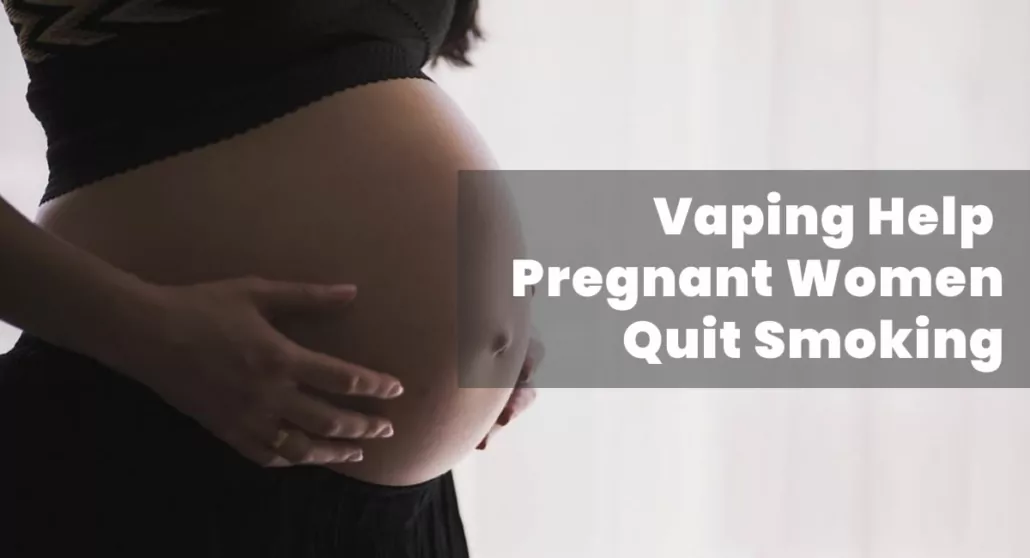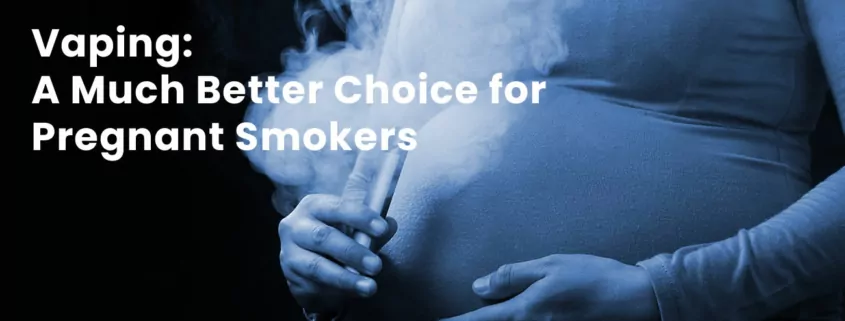Vaping Is A Better and Safer Alternative for Pregnant Smokers
For pregnant women grappling with nicotine addiction, quitting smoking entirely can be a daunting challenge. Traditional cigarettes are linked to a myriad of health risks, including premature birth and birth defects. In recent years, vaping has emerged as a potential harm reduction strategy. This article delves into the evidence surrounding e-cigarettes, exploring whether they offer a safer alternative for pregnant women seeking to reduce their exposure to harmful chemicals.
Understanding the Risks of Smoking During Pregnancy
Before delving into the potential role of vaping, it’s crucial to understand the severe risks associated with smoking during pregnancy:
- Increased risk of miscarriage and stillbirth1
- Higher likelihood of premature birth and low birth weight2
- Increased risk of birth defects, including cleft lip and palate3
- Higher risk of Sudden Infant Death Syndrome (SIDS) 4
- Potential long-term health effects on the child, including respiratory issues and cognitive impairments5
These risks stem from the thousands of harmful compounds present in tobacco smoke, many of which can cross the placenta and directly affect fetal development. Of particular concern is carbon monoxide, which can significantly reduce oxygen supply to the developing fetus6.
Vaping vs. Smoking: A Harm Reduction Perspective
While complete abstinence from nicotine during pregnancy is ideal, for many women, quitting smoking can be extremely challenging. In this context, vaping has emerged as a potential harm reduction strategy. Here’s why:
Reduced Exposure to Harmful Chemicals
E-cigarette vapor contains significantly fewer toxic chemicals compared to tobacco smoke. A study by Public Health England found that e-cigarettes are 95% less harmful than traditional cigarettes7. While this study was not specific to pregnancy, it highlights the substantial difference in harmful exposures.
Nicotine Delivery
The primary concern with vaping during pregnancy is nicotine exposure. However, it’s important to note that nicotine replacement therapy (NRT) is considered acceptable for pregnant women who can’t quit smoking8. Vaping allows for more precise control over nicotine intake compared to smoking, potentially enabling gradual reduction.
Absence of Carbon Monoxide
Unlike smoking, vaping does not produce carbon monoxide. This is a significant advantage, given the particularly harmful effects of carbon monoxide on fetal development.
The Stance of Health Organizations
Several reputable health organizations have recognized the potential of vaping as a harm reduction tool for pregnant smokers:
- The Royal College of Midwives (RCM) states in their position statement that for women who cannot quit smoking during pregnancy, vaping may be a less harmful alternative9.
- The UK Smoking in Pregnancy Challenge Group, which includes the RCM and other professional bodies, supports the use of e-cigarettes for pregnant women who struggle to quit smoking10.
- Public Health England (now the UK Health Security Agency) has included information about e-cigarettes in their guidance for healthcare professionals supporting pregnant women to stop smoking11.

Guidelines for Pregnant Women Considering Vaping
For pregnant smokers considering vaping as a harm reduction strategy, the following guidelines, based on recommendations from the Royal College of Midwives, may be helpful:
- Prioritize quitting smoking completely as soon as you discover you’re pregnant or planning for a baby.
- If vaping helps you remain smoke-free, it may be a preferable alternative to continued smoking.
- Inform your midwife if you’re vaping instead of smoking during pregnancy or postpartum. They should record you as a non-smoker.
- If vaping helps you stay smoke-free while breastfeeding, continue to do so. Current evidence doesn’t suggest adverse effects on nursing mothers or their infants from vaping.
- Always consult with your healthcare provider before making decisions about smoking cessation strategies during pregnancy.
The Importance of Support and Education
While vaping may offer a less harmful alternative to smoking during pregnancy, it’s crucial to emphasize the importance of comprehensive support and education:
- Smoking Cessation Services: Pregnant women should be encouraged to use specialized smoking cessation services, which can provide personalized support and guidance.
- Mental Health Support: Addressing underlying stress and mental health issues can be crucial in helping pregnant women quit smoking or switch to less harmful alternatives.
- Partner and Family Involvement: Educating partners and family members about the importance of a smoke-free environment can provide crucial support for pregnant women trying to quit.
- Accurate Information: Healthcare providers need access to up-to-date, evidence-based information about vaping and pregnancy to provide accurate advice to their patients.
Conclusion: A Pragmatic Approach to Harm Reduction
While complete abstinence from nicotine during pregnancy remains the ideal scenario, the reality is that many pregnant women struggle to quit smoking. In this context, vaping may offer a less harmful alternative that could significantly reduce risks to both mother and baby.
It’s crucial to approach this issue with nuance and pragmatism. While vaping during pregnancy is not risk-free, for women who would otherwise continue to smoke, it represents a substantial harm reduction opportunity. Healthcare providers and public health initiatives should focus on providing accurate, non-judgmental information to help pregnant women make informed decisions about their health and the health of their unborn children.
As research in this area continues to evolve, it’s essential to stay informed about the latest findings and recommendations. Pregnant women considering vaping as an alternative to smoking should always consult with their healthcare providers to make the best decision for their individual circumstances.
References:
- Pineles, B. L., Park, E., & Samet, J. M. (2014). Systematic review and meta-analysis of miscarriage and maternal exposure to tobacco smoke during pregnancy. American journal of epidemiology, 179(7), 807-823. https://pubmed.ncbi.nlm.nih.gov/24518810/ ↩︎
- Ko, T. J., Tsai, L. Y., Chu, L. C., Yeh, S. J., Leung, C., Chen, C. Y., … & Hsieh, W. S. (2014). Parental smoking during pregnancy and its association with low birth weight, small for gestational age, and preterm birth offspring: a birth cohort study. Pediatrics & Neonatology, 55(1), 20-27. https://pubmed.ncbi.nlm.nih.gov/23850094/ ↩︎
- Little, J., Cardy, A., & Munger, R. G. (2004). Tobacco smoking and oral clefts: a meta-analysis. Bulletin of the World Health Organization, 82, 213-218. https://pubmed.ncbi.nlm.nih.gov/15112010/ ↩︎
- Zhang, K., & Wang, X. (2013). Maternal smoking and increased risk of sudden infant death syndrome: a meta-analysis. Legal medicine, 15(3), 115-121.https://pubmed.ncbi.nlm.nih.gov/23219585/ ↩︎
- Oken, E., Levitan, E. B., & Gillman, M. W. (2008). Maternal smoking during pregnancy and child overweight: systematic review and meta-analysis. International journal of obesity, 32(2), 201-210. https://pubmed.ncbi.nlm.nih.gov/18278059/ ↩︎
- Venditti, C. C., Casselman, R., & Smith, G. N. (2011). Effects of chronic carbon monoxide exposure on fetal growth and development in mice. BMC pregnancy and childbirth, 11(1), 1-8. https://bmcpregnancychildbirth.biomedcentral.com/articles/10.1186/1471-2393-11-101 ↩︎
- McNeill, A., Brose, L. S., Calder, R., Hitchman, S. C., Hajek, P., & McRobbie, H. (2015). E-cigarettes: an evidence update. Public Health England, 3, 47. https://assets.publishing.service.gov.uk/media/5b6c3f57ed915d30f140f822/Ecigarettes_an_evidence_update_A_report_commissioned_by_Public_Health_England_FINAL.pdf ↩︎
- Coleman, T., Chamberlain, C., Davey, M. A., Cooper, S. E., & Leonardi‐Bee, J. (2015). Pharmacological interventions for promoting smoking cessation during pregnancy. Cochrane database of systematic reviews, (12). https://pubmed.ncbi.nlm.nih.gov/26690977/ ↩︎
- Royal College of Midwives. (2019). Support to Quit Smoking in Pregnancy Position Statement. https://www.rcm.org.uk/media/3394/support-to-quit-smoking-in-pregnancy.pdf ↩︎
- Royal College of Midwives. (2019). Support to Quit Smoking in Pregnancy Position Statement. https://www.rcm.org.uk/media/5526/rcm-position-statement-support-to-quit-smoking-in-pregnancy.pdf ↩︎
- Public Health England. (2021). Stopping smoking in pregnancy: A briefing for maternity care providers. https://www.ncsct.co.uk/publications/briefing_for_midwifery_staff ↩︎
- Is It Illegal to Vape or Smoke While Driving in Minnesota? - August 15, 2025
- American Airlines Vaping Passenger Alleges Assault in Police Report - August 15, 2025
- NEXA PIX 35K Disposable Vape with Crystal Tank Review - August 15, 2025






 Ecigator
Ecigator

